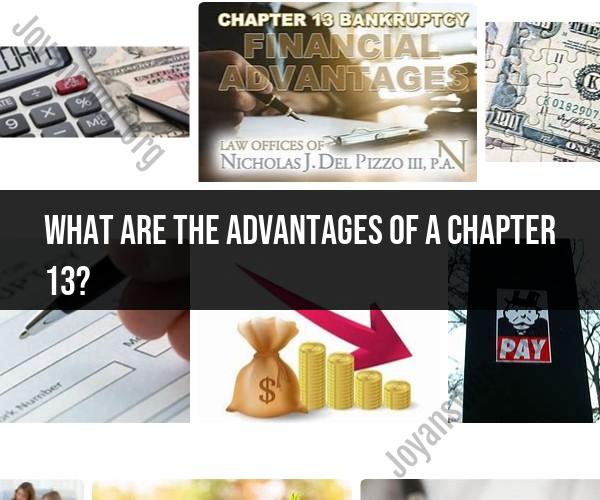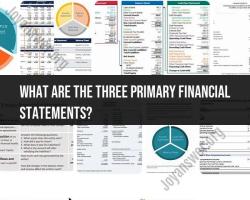What are the advantages of a chapter 13?
Filing for Chapter 13 bankruptcy can offer several advantages for individuals who are facing financial difficulties and seeking debt relief. Here are some of the key advantages of Chapter 13 bankruptcy:
Debt Repayment Plan: Chapter 13 bankruptcy allows individuals to create a court-approved repayment plan that spans three to five years. This plan allows debtors to make manageable monthly payments based on their income and reasonable living expenses.
Protection from Creditors: Once a Chapter 13 bankruptcy petition is filed, an automatic stay is put in place. This legal protection prevents creditors from taking collection actions, including foreclosure, repossession, wage garnishment, and harassing collection calls.
Preservation of Assets: Chapter 13 bankruptcy allows debtors to keep their assets, including their home and car, as long as they adhere to the repayment plan. This can be particularly beneficial for individuals who want to avoid losing their property.
Debt Discharge: At the successful completion of the repayment plan, many remaining unsecured debts are discharged. This means that certain debts, such as credit card balances and medical bills, are eliminated, providing a fresh financial start.
Co-Signer Protection: If you have co-signers on your loans, Chapter 13 can protect them from creditor actions during the repayment period.
Flexibility: Chapter 13 bankruptcy plans can be tailored to fit your specific financial situation, making it a flexible option for individuals with various income levels and types of debt.
Avoiding Tax Debt: Some types of tax debt can be included in the Chapter 13 repayment plan, helping debtors manage their tax liabilities.
Credit Reporting: While Chapter 13 bankruptcy will appear on your credit report, it may have a less severe impact on your credit score compared to Chapter 7 bankruptcy. Additionally, you can begin rebuilding your credit during the repayment plan.
Opportunity to Cure Mortgage Arrears: If you're behind on your mortgage payments, Chapter 13 allows you to catch up on arrears through the repayment plan, potentially preventing foreclosure.
Financial Education: Chapter 13 bankruptcy often requires debtors to undergo financial counseling, which can provide valuable knowledge and skills for managing finances in the future.
It's important to note that Chapter 13 bankruptcy is not suitable for everyone, and eligibility depends on various factors, including income and the amount of debt. Before filing for bankruptcy, it's advisable to consult with a qualified bankruptcy attorney who can assess your individual situation and help you understand your options, whether it's Chapter 13 or another form of debt relief. Additionally, bankruptcy has long-term financial and legal consequences, so it should be considered carefully as a last resort after exploring other alternatives.
Chapter 13 Bankruptcy: Advantages and Benefits for Debtors
Chapter 13 bankruptcy is a type of bankruptcy that allows individuals to repay their debts over time through a court-approved repayment plan. Chapter 13 bankruptcy can be a good option for individuals who have a steady income and who want to keep their assets, such as their home or car.
Here are some of the advantages and benefits of Chapter 13 bankruptcy for debtors:
- Stop foreclosure: Chapter 13 bankruptcy can help to stop foreclosure on your home. If you are behind on your mortgage payments, Chapter 13 bankruptcy can allow you to catch up on your payments over time.
- Stop creditor harassment: Chapter 13 bankruptcy can help to stop creditor harassment. Once you file for Chapter 13 bankruptcy, your creditors are not allowed to contact you directly. Instead, they must communicate with you through your bankruptcy attorney.
- Reduce your debt: Chapter 13 bankruptcy can help you to reduce your debt. In some cases, you may be able to reduce the amount of debt that you owe.
- Keep your assets: Chapter 13 bankruptcy allows you to keep most of your assets, such as your home and car.
- Get a fresh start: Chapter 13 bankruptcy can help you to get a fresh start financially. Once you complete your Chapter 13 repayment plan, your remaining debts will be discharged.
A Fresh Start: Exploring the Positives of Chapter 13 Bankruptcy
Chapter 13 bankruptcy can be a valuable tool for individuals who are struggling with debt. It can help them to stop foreclosure, stop creditor harassment, reduce their debt, keep their assets, and get a fresh start financially.
Of course, there are also some potential downsides to Chapter 13 bankruptcy. For example, you will need to make regular payments to your bankruptcy trustee, and you will not be able to take on new debt without the permission of the court. However, for many individuals, the benefits of Chapter 13 bankruptcy outweigh the drawbacks.
Debt Resolution with Chapter 13: Understanding the Advantages
Chapter 13 bankruptcy can be a good option for individuals who have a steady income and who want to keep their assets, such as their home or car. Chapter 13 bankruptcy can also be a good option for individuals who have a lot of debt, but who do not want to liquidate their assets to pay off their debts.
If you are considering Chapter 13 bankruptcy, it is important to speak with a qualified bankruptcy attorney. A bankruptcy attorney can help you to understand your options and to determine if Chapter 13 bankruptcy is the right choice for you.
Conclusion
Chapter 13 bankruptcy can be a valuable tool for individuals who are struggling with debt. It can help them to stop foreclosure, stop creditor harassment, reduce their debt, keep their assets, and get a fresh start financially. If you are considering Chapter 13 bankruptcy, it is important to speak with a qualified bankruptcy attorney.












